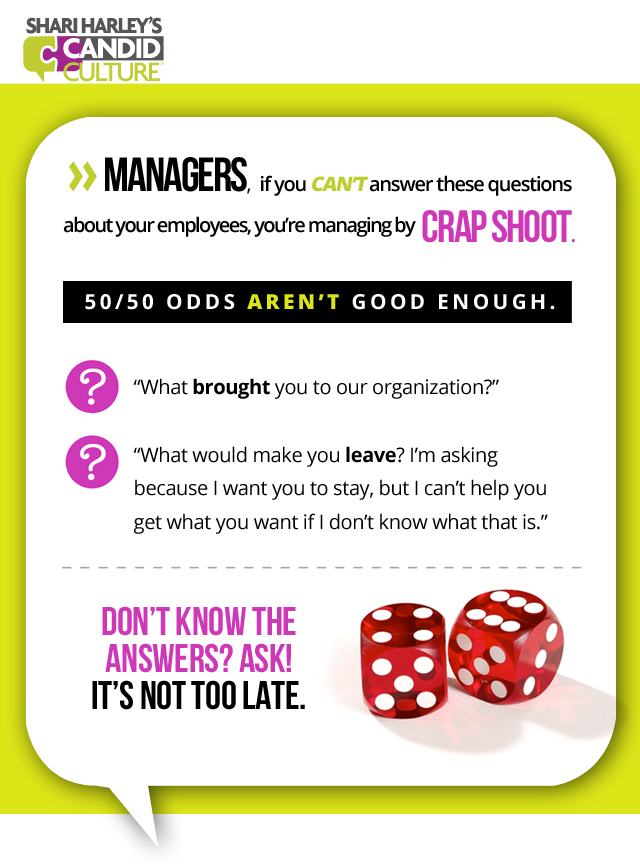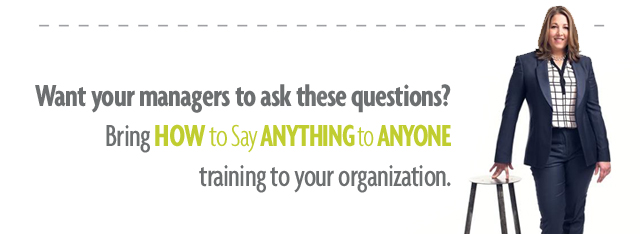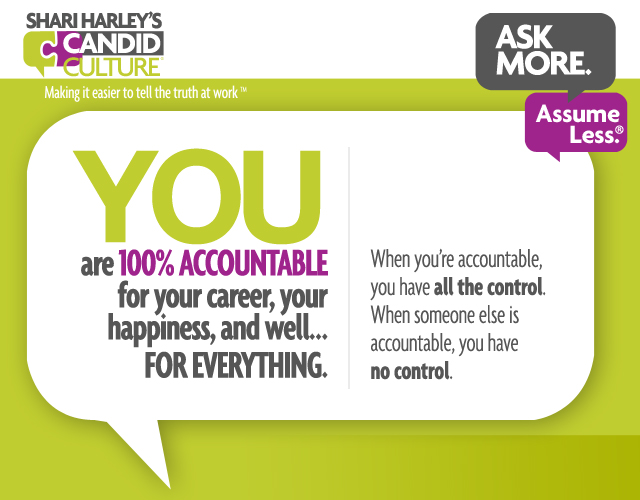Posts Tagged ‘100% accountable’
Last week we had movers in our warehouse moving products in and out of storage. The movers charged by the hour. Shortly after they arrived, I noticed one of the movers on his phone. Then I noticed another on his phone. I didn’t say anything. The phone use continued. So, I politely asked the two movers to only use their phones when they were on a break. And then I felt badly about saying something and spent the rest of the day apologizing. I didn’t want them to think I was ‘mean’.
I know it was ok to hold them accountable. I was paying a lot of money for their time. It was completely reasonable to expect them to be working. But I want to be liked and approved of (yes, even by the movers who I’ll never see again).
Every time I apologized or sought to justify my message, my communication lost power. Why say anything if I’m going to spend the day regretting and retracting my message?
After the experience with the movers, I realized how often I apologize for making requests, even perfectly legitimate and modest requests. And I’m wondering why I do this? Are we taught it’s not ok to ask for things?

Making requests is a subtle form of giving feedback. It’s less direct than what I call the “tell method.”
It’s ok to have expectations. It’s ok to make requests. And it’s ok to hold people accountable. I know this. You know this. And yet, I see how often I and others apologize for making requests and giving feedback. I feel like we need a regular pep talk – a little bird whispering in our ear each time we ask someone to do what we hired them to do. “It’s ok to ask. You aren’t mean. It’s ok to hold people accountable. If people don’t want to do the work they agreed to or can’t accept feedback, they’re not the right people.”
I’ll just keep giving myself that pep talk, because it’s ok to ask and not feel badly about it.

Twenty years ago, during my annual performance review, my manager said, “You had a great year. You rolled out 18 new training programs and got more participation in those programs than we’ve ever seen in the past. But you’re all substance and no sizzle. You’re not good at sharing the work you’re doing, and as a result my boss doesn’t know enough about what you’re doing and to support a large raise for you, so I can’t even suggest one.”
That happened to me ONCE, and I swore it would never happen again.
Too many people believe that if they do good work, the right people will notice and they will be rewarded appropriately. Part of this thinking is accurate. To be rewarded appropriately, you need to be doing good work. But the people in a position to reward you also need to know what you’re doing and the value you’re adding.

You need to find a way to share the value you’re providing without going over your boss’s head, sucking up, or alienating your coworkers.
Here are three ways to manage up while strengthening your business relationships.
All of these practices work whether you’re working virtually, hybrid, or in the office full-time.
Manage up tip number one: Ask your manager’s permission to send him a weekly update of what you accomplished during the week. This should be a one-page, easy-to-read, bulleted list of accomplishments or areas of focus.
Your boss is busy doing his own work. As a result, you need to let him know about the work you’re doing. Don’t make him guess.
Manage up tip number two: Periodically share what you’re doing with the people your manager works for and with. That can sound like, “I just wanted to share what my department is accomplishing. We’re really excited about it.” Ask your manager’s permission to do this and tell her why you want to do it (to ensure that the senior people in your organization are in-the-know about what your department’s accomplishments).
If you’re not sure who can impact your career and thus who you should inform about your work, ask your manager. She knows and will tell you, if you ask.
Manage up tip number three: Use the word “we” versus “I.” “We accomplished…..” “We’re really excited about….” Using the word “we” is more inclusive and makes you sound like a team player versus a lone ranger.
Don’t assume that people know what you’re doing or the value you’re adding to your organization. Instead, assume people have no idea and find appropriate ways to tell them. You are 100% accountable for your career.

Most employees need only a handful of things to be satisfied and productive at work. The key is getting employees to tell you what those things are. And they might just tell you, if you ask.

Effective management involves asking questions during the interview process, after an employee starts, and again 90-days to six months into the job.
I recommend asking the seven questions below. I call the questions, Candor Questions.
Candor Question number one: “What brought you to this company? Why did you accept this job? What are you hoping the job will provide?” Ask one of these three questions. Pick the one you like best.
Candor Question number two: “What would make you leave this job? What are your career deal breakers, things you just can’t tolerate at work?” Ask either of these questions.
Candor Question number three: “What type of work, skills, and/or areas of our business do you want to learn more about?”
Candor Question number four: “Tell me about the best manager you ever had. What made him/her the best manager?” This will tell you what the employee needs from you as a manager and is a much better question than, “What do you need from me as your manager?” That is a hard question to answer. Telling you the best manager s/he ever had is easy.
Candor Question number five: “Tell me about the worst manager you ever had? What made him/her the worst manager?”
Candor Question number six: “What are your pet peeves at work? What will frustrate you?” Why find out the hard way what frustrates employees when it’s so easy to ask. This question demonstrates that you want your employees to be happy and that you will flex your own preferences, when possible, to meet employees’ needs.
Candor Question number seven: “How do you feel about being contacted via cell phone or text outside of business hours? How do you feel about receiving emails during the evenings and weekends?”
If you’ve participated in one of our management trainings or received a box of Candor Questions for Managers, you know I could go on . But these seven questions are a good start.
Regardless of age, work, and educational background, employees have a few things in common.
Employees want to:
• Work for someone who takes an interest in and knows them
• Feel valued and appreciated for their contributions
• Be part of and contribute to something greater than themselves
• Feel respected as a person. Managers respect their time, expertise, and needs
Taking the time to get to know employees throughout your working relationship accomplishes many employee needs.
If you have long time employees, it’s never too late to ask these questions. Regardless of for how long employees have worked for you, they’ll appreciate you asking. Don’t worry that employees will raise an eyebrow and wonder why you’re asking now. They’ll just be happy you’re asking. You can simply say, “I realized that I’ve never overtly asked these questions. I just assume I know. But I don’t want to do that. During our next one-on-one meeting I’d like to ask you these questions and you can ask me anything you’d like.”
If you have a manager who will never ask you these questions, provide him/her the information. Don’t wait to be asked. You’re 100% accountable for your career. Tell your manager, “There are a few things about myself I want to share with you. I think this information will help ensure I do great work for the organization for a long time.”
Managers, the better your relationship with your employees and the more you know about what your employees need from you, the organization, and the job, the easier employees are to engage, retain, and manage. Stop guessing and start asking.

Breakdowns happen. There will be days people won’t give you what you need to complete projects. Things will break. And you will look bad. When breakdowns happen, I always ask myself, “What could I have done to prevent this situation?” or “What did I do to help create this situation?” I see myself as accountable for whatever breakdowns occur.
It may sound odd that I always look at myself when breakdowns occur, even when it’s someone else who didn’t do their job, but it’s just easier. I can’t control anyone else. But I can control me (admittedly, some days I do a better job at this than others). When I can identify something I could have done to make a situation go differently, I feel more in control – aka better.

It’s like getting off a highway versus sitting in bumper-to-bumper traffic. The alternate route may take longer, but at least I’m moving. I feel like I’m doing something and thus have more control. Taking responsibility for everything that happens to you is similar. When you’re accountable, you can do something to improve your situation. When someone else is accountable, you’re at the mercy of other people and have very little control.
There are, of course, exceptions to the practice that “we’re always accountable.” Terrible acts of violence, crime, and illness happen to people, about which they have no control. But in general, in our day-to-day lives, there is typically something we did to contribute to a bad situation or something we can do to improve it.
Here are five practices for improving difficult situations, even when you didn’t create the mess (alone).
1) Ask more questions. If you’re not clear about what someone is expecting from you, ask. You’re responsible for doing good work, regardless of the type of direction you receive.
2) Tell people what you think they’re expecting and how you’re planning to approach a project or task, to ensure everyone’s expectations are aligned. Clarifying expectations beats doing several weeks worth of work, only to discover what you created isn’t what someone else had it mind.
3) Ask for specific feedback as projects progress. Don’t wait until the end of a project to find out how you performed.
4) Say “thank you” to whatever feedback you receive versus defending yourself. People will be pleasantly surprised and their upset will dissipate more quickly. That could sound like, “That’s good feedback. I’m sorry that happened. Thank you for telling me.”
5) Admit when you make a mistake or when you wish you had done something differently. Don’t wait for someone to tell you. Saying, “I’m sorry. How can I make this right with you?” goes a long way.
I consistently ask the following questions:
“What could I have done differently?”
“What did I do to contribute to this situation?”
“What can I do now to make this situation better?”
I encourage you to ask these questions, even when someone else drops the ball. You can’t control others, but you can control you. And your happiness and success is your responsibility.











